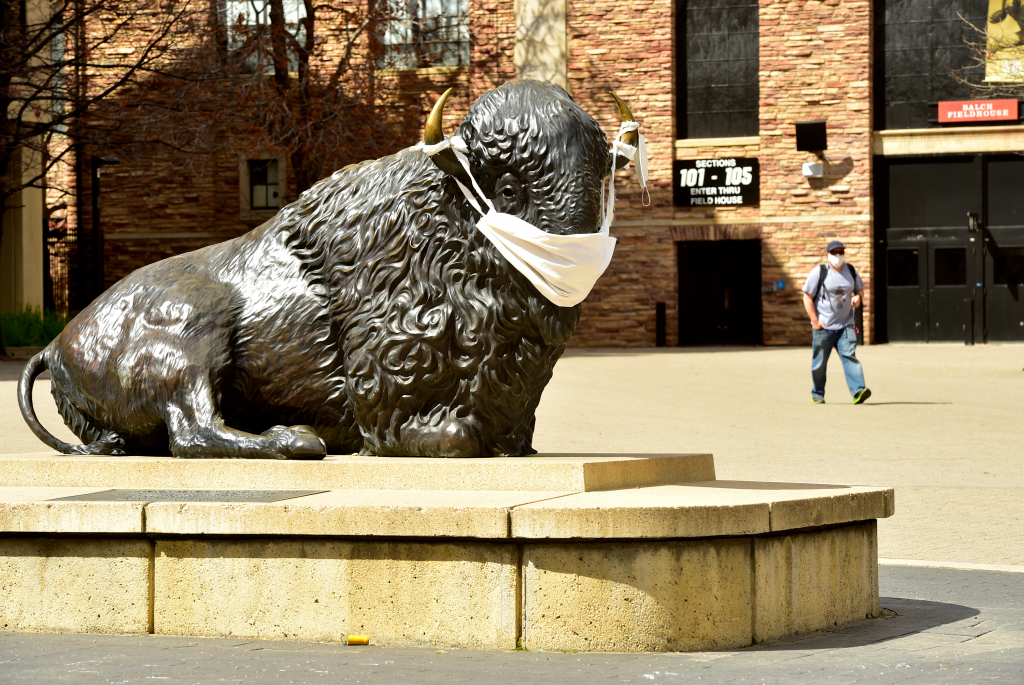Boulder County health officials on Tuesday urged all local University of Colorado students to self-quarantine for two weeks to contain a COVID-19 surge, a dramatic step that came hours after state leaders warned of a “very substantial increase” in cases among college-aged people.
In a letter to the CU Boulder community, Jeffrey J. Zayach, executive director of Boulder County Public Health, strongly recommended — but did not order — the quarantine measures, to begin at 11:59 p.m. Tuesday.
“More stringent and mandatory restrictions will be imposed if students do not comply and break the transmission cycle,” Zayach wrote.
Students in self-quarantine should remain at home other than to attend in-person classes, labs, research activities and intercollegiate athletic training, Zayach wrote. Students can also leave their homes to work, exercise by themselves, get food through delivery or curbside pickup, and obtain medicine or other supplies needed to “sustain or protect life” that can’t be delivered.
If more than 10 unrelated people live together, Zayach said they should make every effort to separate from each other and wear masks if they must come into contact.
Dr. Rachel Herlihy, Colorado’s state epidemiologist, said during a news conference with Gov. Jared Polis on Tuesday that there has been a “very substantial increase” in coronavirus infections among college-aged people in the state — particularly among freshmen and sophomores.
Six outbreaks in Colorado have been linked to universities, Herlihy said, and that number could double when the new state outbreak list is released Wednesday.
Tuesday night, CU Boulder Chancellor Phil DiStefano sounded the alarm in a message to the CU community with what he declared an “urgent request.”
“We need to stop the recent rise in positive COVID-19 cases immediately,” DiStefano wrote, pointing to off-campus gatherings as the significant driver in CU’s surge in cases.
Of the 308 coronavirus cases confirmed by the university between Aug.24 and Sunday, 71% were among people living off-campus. Since issuing that message, the university confirmed 77 more cases from tests on Monday — the second-highest single-day total of positive cases following Friday’s 89 cases.
On Saturday, more than 40 people from Boulder County Public Health, the city of Boulder, CU and the Colorado Department of Public Health and Environment came together to address the issue, slow the current case trend and prevent future spikes, said Chana Goussetis, Boulder County Public Health spokeswoman.
The group developed a three-pronged strategy — prevention, mitigation and containment — to protect health and safety, jobs, education and mental health, Goussetis said.
“Unfortunately, it’s not as simple as closing campus,” Goussetis wrote in an email. “It won’t be effective in stopping social gatherings because most students live off-campus.”
CU Boulder applied mathematics student Jamie George, 22, said she understood the spread was largely happening off-campus, but that those students are there because the university welcomed them back to town for the fall semester.
“I think the university should go all remote, but, unfortunately with that, there’s now the risk that students are going to go home and spread it in their communities, as well,” George said. “There’s not really a good solution anymore. CU has let this go too far it seems.”
Moving forward, Goussetis said the university along with local and state public health agencies will:
- Explain the data, implications and options to CU students and ask for input among sorority and fraternity members and the community
- Increase resources such as food delivery and laundry service to help those quarantining
- Create “COVID-safer” spaces and events for young peopl
- Expand testing capacity and improve testing access for off-campus students
- Discuss public health orders that might reduce gatherings
- Allocate additional resources from CDPHE to CU case investigations
Herlihy noted COVID-19 cases in teens and people in their 20s have gone up while numbers remained largely flat for children under 10, potentially due to college students living in closer quarters and living different lifestyles.
Since the summer, the Boulder public health agency has found COVID-19 case increases linked to parties among college students on University Hill in Boulder and among Greek life organizations.
If CU administrators knew this summer that COVID-19 cases in the county and across the nation were increasing because of student behavior, George wondered why the university chose to bring students back in the first place.
“They invited 30,000 students back to campus and didn’t expect any of them to party or go see friends or act irresponsibly?” George said. “I think they probably should have known better that students were still going to party and do things like this and still spread COVID. I think that’s why I’m angry.”
DiStefano noted student behavior driving the spread must change or the community could be subject to more state and county public health directives.
But the virus does not exist in a bubble of academia only spread among young people who are less likely to have severe symptoms. Young people can spread the virus to those who are at higher risk, Herlihy said.
Out of the 631 positive COVID-19 cases confirmed in Boulder County between Aug. 24 and Sunday, 429 — more than 67% — of them are members of the CU Boulder community, according to Goussetis.
“We’ve heard concerns from many Boulder and Boulder County residents about college-age residents participating in large gatherings and parties,” Goussetis wrote. “We’ve heard fears for personal safety, and despair at feeling powerlessness to live their lives safely because of the actions of others. We’ve received calls to close campus and return students back to their home communities.”



















